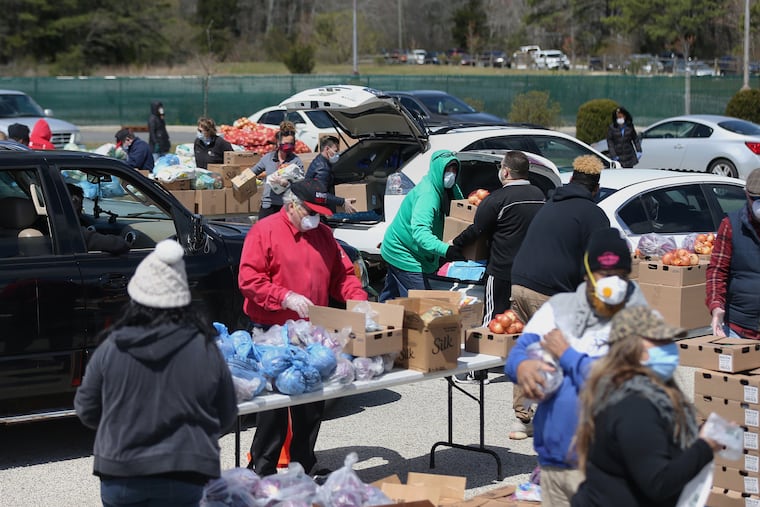Out-of-work Atlantic City casino workers jam traffic for miles in line up for donated food
The massive turnout was sobering. At one point, a police car escorted a truck from the Community Food Bank through the traffic to deliver food. More than 1,500 casino workers got boxes; still more were turned away.

EGG HARBOR TOWNSHIP, N.J. — The line of out-of-work Atlantic City casino workers backed up for miles, snaked around empty department stores, continued across from a closed movie theater, crawled by an Amish furniture store, and then went around the motor vehicles office.
The workers — dealers, cooks, valets, housekeepers, banquet servers — were at this shuttered shopping mall on the Black Horse Pike on Wednesday to pick up donated food from the Community Food Bank of South Jersey. Flash your ID — Harrah’s, Ocean, Hard Rock, Tropicana, Borgata, Resorts among those represented — and pop your trunk.
The casino workers, about 1,500 of whom were finally were able to get through the traffic and the enormous queue, left with a 14-day meal kit, plus supplemental boxes of onions, milk, fruit, and vegetables.
“It’s a little help,” said Diego Ramirez, a bartender at the Borgata for 15 years, as he waited in the line. “I just hope they open quick. But safely.”
The food giveaway was sponsored by the Food Bank and Unite Here Local 54, which represents about 9,000 of the city’s nearly 27,000 casino workers. All casino workers were eligible for Wednesday’s food donation. Some also volunteered, like the crew of banquet servers from Harrah’s and Borgata repurposing their skill sets.
The turnout was sobering. At one point, a police car with flashing lights escorted the big box truck of food coming from the food bank to the distribution point. It underscored the urgency of the moment.
In all, 1,500 casino workers got boxes of food and additional produce, and 300 more got produce after the boxes ran out, said Kim Arroyo of the Community Food Bank. Others were turned away after the food ran out.
These casino workers have been through plenty: bankruptcies and closures, Hurricane Sandy, the devastating recession of 2008, seasonal layoffs, strikes.
But the coronavirus pandemic, which shut down all nine casinos on March 16, seemed to them somehow worse than all of that.
“I miss seeing a smile,” said Jeanette Lamparty, one of the banquet servers helping to load up the supplemental boxes with a crew of their fellow banquet servers.
“I just want to see a face without a mask,” said co-worker Brenda Ford.
Working together, if just for a few hours and with masks and gloves, outside in a chilly wind, in a way they surely would never have expected to replace the jobs they love, it was at least somewhat familiar: serving food to lots of people, friendly camaraderie, practiced efficiency.
But the massive turnout, which caused some fender benders and prompted police to close off certain entrances for a time, weighed heavily on everyone there. The need was overwhelming, as people waited for hours and several new trucks arrived.
One by one, the cars reached the distribution point, and trunks were filled with needed food. Donna Britto, a dealer at Resorts for the last eight years, stepped out of her car to open the trunk. Several family members were with her.
“Terrible, terrible,” she said. “We all work at Resorts. It helps out a lot.”
You could tell she and the others were veteran hospitality workers, as most managed smiles and friendly greetings even under distress. “I’m sorry,” she said, then called out: “You have a good day.”
Yue Chao Mei, a 16-year Borgata dealer, was concerned about how safe it would be to return to work. “It’s very tough,” he said. “I don’t know. Too many people will be together.”
Ivan Mendez, a banquet server, wore his Bally’s windbreaker as he waited in line. Others wore Hard Rock winter caps or union strike sweatshirts from years past, or relics of casinos that were permanently closed by economic forces, like the Showboat.
“I’m very nervous,” Ford said as she loaded cabbages. “I’m very concerned. This is the worst. This is far worse than Sandy or the strike or the recession in 2008. This is worse. You can’t see your family. My mother’s in a nursing home.”
Arroyo, director of agency relations and programs for the Food Bank, said the response was quadruple what similar donations had drawn in the past, including after Sandy. She said there was continuing need for donations and volunteers. She said those who arrived too late would be redirected to neighborhood pantries and the food bank itself, at 6735 Black Horse Pike.
“There’s a great need in our community,” she said. “I’m very worried about running out. The casino industry is what helps support most of our residents.” Another event is planned, she said.
“I don’t think any community in the country had to deal with this particular thing, where the entire industry is out of work,” said Bob McDevitt, president of Local 54, who has manned his union ship through strikes, hurricanes, bankruptcies, closures.
Atlantic County is projected to be the third-worst-hit region economically in the country by the pandemic. A recent economic forecast from Stockton University said as much as $5.1 billion could be siphoned out of the local economy. Many casino workers are seasonal and do not qualify for unemployment.
“In this moment, this is I think the worst” of any setbacks, McDevitt said. “Right now, it feels like this is worse than anything that’s ever happened in my lifetime.”